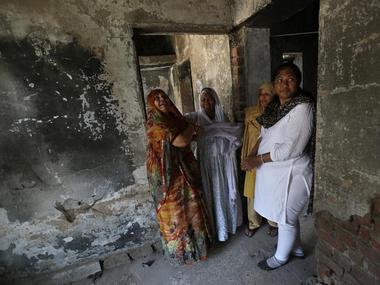Thursday’s conviction of 24 people involved in the Gulbarg Society massacre should tell us how integral a vibrant civil society is to the functioning of a democracy, especially when political systems that are supposed to protect us are instead complicit in such violence. If partial justice has finally been delivered in case of the massacre of 69 people in Gulbarg Society, it is because of the survivors’ dogged perseverance as well as activist Teesta Setalvad’s relentless efforts to not let the case fall by the wayside. Fourteen years of painstaking work in the face of innumerable risks and threats have finally delivered to the survivors some sense of justice. [caption id=“attachment_2812352” align=“alignleft” width=“380”] File image of the survivors of the 2002 Gujarat riots inside a house that was burnt and damaged in the riots at the Gulbarg Society. Reuters[/caption] If active civil society intervention is worthy of attention, the political class’s indifference and continued passivity is equally condemnable. That the BJP — which has ben in power in Gujarat for over two decades — might throw a spanner in the wheels of justice, was predictable from the very start of the trials. The killings took place on the watch of Narendra Modi, then the chief minister of the state. But also striking is the role (or rather the absence of it) of the Congress, the BJP’s main political adversary. The main Opposition did very little by way of helping or standing by the survivors, other than indulging in cheap electoral rhetoric. Other “secular” parties — the Samajwadi Party or the Left parties, for instance — also followed in the Congress’ footsteps. Even as the entire political system failed the survivors, the judiciary and civil society organisations have stood by them over the years. Without them, the survivors of Gulbarg Society would not have seen the day they did. We might ask then, what the Modi government achieves by weakening civil society organisations — especially when our political system is so badly broken. Political parties in this country do not protect human rights. If anything, they have an infamous record in violating them. Civil society organisations have always stepped in to fill this vacuum and speak for the victims of human rights abuse. Rather than strengthen these non-state actors, why does the government appear so determined to drive them out of public space? One apparent answer seems to be the autonomy that so many of these organisations enjoy and the challenges they pose to the government through their work and contrarian views. Their activists’ direct contact with the underclasses, usually leveraged as captive vote-banks by political parties, renders them suspicious in the eyes of the government. One of the Modi government’s stated grouses against these organisations is their intervention in politics, policy-making, and society at large. No such bar however seems to apply to BJP-friendly organisations, particularly “cultural and social” organisations like the RSS. In going after activists and critics like Teesta Setalvad or Greenpeace member Priya Pillai, the ruling BJP is deliberately shrinking the public space for civil society organisations that dissent from its political views. We need non-state and non-party actors to go where political parties usually prefer not to tread. Political parties have both failed to and often actively exploited the lives of the most vulnerable sections of the Indian population: Minorities, women, tribals, landless labourers, workers. Civil society organisations have a vacuum to fill precisely because the political class has actively overseen processes by which millions of Indians have been pushed to the brink of poverty, immiseration, and death. The track records of most such organisations has been beyond reproach. Civil society organisations formed the backbone of the movement of survivors of the 1984 massacre of Sikhs. Human rights organisations like the People’s Union for Democratic Rights (PUDR), People’s Union of Civil Liberties (PUCL), have unfailingly visited innumerable sites of riots over the decades, chronicling narratives of victims and survivors and petitioning the courts for justice. These are virtually the only non-mass-based organisations in the country that repeatedly — even in the face of constant threats – investigate major events like massacres and relatively minor, everyday ones like the violation of labour rights around the country. Left to the will of political parties, justice would perhaps rarely see the light of day for many who have been violated and wronged. Without vigilant civil society organisations, India would be a poorer democracy.
Thursday’s conviction of 24 people involved in the Gulbarg Society massacre should tell us how integral a vibrant civil society is to the functioning of a democracy, especially when political systems that are supposed to protect us are instead complicit in such violence
Advertisement
End of Article


)
)
)
)
)
)
)
)
)



